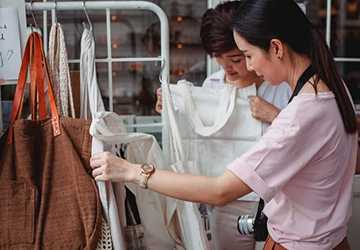In the modern world, conscious consumerism is gaining momentum. People are becoming increasingly aware of the ethical implications of their buying choices. Regarding the fashion industry, the term Ethical Fashion Brands has become a buzzword. But what exactly makes a fashion brand moral? This article will delve into the Criteria for Ethical Fashion and provide an Ethical Fashion Guide to help consumers make informed choices.
A Closer Look at Ethical Fashion
Firstly, let's explore what we mean when we say ethical fashion. It's a multi-faceted concept that includes various aspects like sustainable materials, fair wages, ethical treatment of workers, and transparent supply chains. However, many people think it's just about environmentally friendly products. In reality, it encompasses so much more.

Sustainability and Materials
One of the critical components of Ethical Fashion Brands is the use of sustainable materials. Instead of using synthetic materials that take years to decompose, ethical brands opt for eco-friendly options. They prioritize organic cotton, hemp, or bamboo, which are suitable for the environment and the skin.
Fair Wages and Worker Treatment
The ethical aspect of fashion also extends to the workforce. Companies that meet the Criteria for Ethical Fashion ensure that their workers receive a living wage and work under safe conditions. These brands have certifications that attest to their ethical practices.
Transparency and Traceability
Another criterion for ethical fashion is transparency. Ethical brands make it a point to be transparent about their supply chain. They disclose information about their materials' origin and how their products are made. This form of transparency allows consumers to make informed decisions.
The Importance of Ethical Fashion Choices
Now that we understand ethical fashion, let's discuss why it's essential. Our choices as consumers have a significant impact. When we buy from Ethical Fashion Brands, we vote with our wallets for a more sustainable future.
Environmental Impact
Fast fashion is one of the largest polluters in the world. Brands that adhere to the Criteria for Ethical Fashion aim to reduce this environmental impact. They invest in eco-friendly materials and manufacturing processes that are less environmentally harmful.
Social Impact
In addition to the environmental aspect, ethical fashion has a social component. Many ethical brands work directly with artisans, providing them with a platform to showcase their skills and make a living.
Personal Satisfaction
Making ethical choices in fashion isn't just about the broader impacts. It also brings a sense of personal satisfaction. Knowing that your purchase didn't come at the expense of someone else's well-being adds value to the product you've bought.
Tips to Choose Ethical Fashion Brands
Finally, let's go through a quick Ethical Fashion Guide to help you make better shopping choices.
Research the Brand
Before making a purchase:
1. Do some research.
2. Check if the brand meets the Criteria for Ethical Fashion.
3. Look for certifications and read about their sustainability efforts.
Read Reviews
Customer reviews can give you much insight into a brand's ethical practices. If many people vouch for the brand, it's usually a good sign.
Look for Transparency
As mentioned earlier, transparency is critical. Brands that are open about their manufacturing processes and supply chain are generally more reliable.
Consider the Price
Ethical fashion is pricier than fast fashion. But remember, you're paying for quality and ethical practices. It's an investment worth making.
Additional Aspects to Consider for Ethical Fashion
As you dig deeper into the ethical fashion world, several other elements are worth considering. These points further enrich your understanding and could be vital in perceiving ethical fashion brands.
Eco-Friendly Packaging
● Recyclable Material: Brands that qualify as Ethical Fashion Brands often use recyclable or biodegradable packaging. This lessens waste and aligns with their commitment to sustainability.
● Minimalist Design: Reducing the use of ink and other materials in the packaging also counts. Minimalist design isn't just trendy; it's eco-friendly.
● Information Transparency: Look for packaging that clearly states the materials used in the product. This level of transparency aligns well with the Criteria for Ethical Fashion.
Vegan Options
● No Animal Products: Ethical brands may offer vegan options that contain no animal products, whether leather, wool, or silk.
● Animal Welfare: Ethical brands often stand against animal cruelty. This shows a broader ethical standpoint that extends beyond human-centric concerns.
● Certifications: Brands that offer vegan options often have certifications like PETA-approved Vegan, enhancing their credibility.

Inclusive Sizing
● Body Positivity: Brands meeting Criteria for Ethical Fashion often provide a range of sizes to cater to different body types.
● Accessibility: Inclusive sizing makes ethical fashion accessible to a larger audience, making the brand more socially responsible.
Community Initiatives
● Local Employment: Some ethical brands focus on local employment, supporting the community where they operate.
● Charity Work: Ethical brands often have a philanthropic side, donating some of their profits to social causes or running charity initiatives.
● Collaboration: Brands sometimes collaborate with NGOs or other organizations to amplify social impact.
Making Ethical Choices: A Recap
Given the numerous considerations in this Ethical Fashion Guide, making ethical choices may initially seem overwhelming. However, each step you take brings us closer to a more honest and sustainable future. When you align your purchases with Ethical Fashion Brands that meet the Criteria for Ethical Fashion, you're not just buying a product but supporting a movement.
The Takeaway
● Being an ethical consumer isn't a one-time event but an ongoing process.
● Your individual choices, when multiplied by millions of consumers, can make a significant impact.
● With resources like this Ethical Fashion Guide, it's becoming easier for consumers to align their shopping choices with their values.
Conclusion
Remembering these points, you can make more informed decisions and contribute to a more ethical and sustainable fashion industry. Armed with this Ethical Fashion Guide, you're better equipped to make choices.





